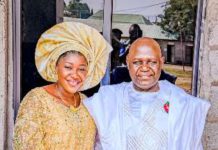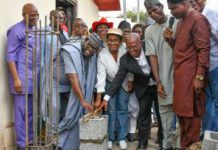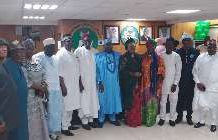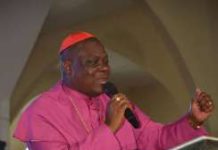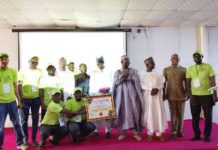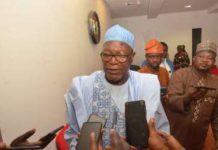By Joy Odor
The International Press Centre (IPC), the Media Rights Agenda (MRA) and the European Union Support to Democratic Governance in Nigeria (EU-SDGN) partners have honoured Institutions, Organizations, Personalities, Students, Abinos Foundation and individuals with Freedom of Information (FOI) Act Award that have plotted to have FOI instituted in Nigeria, proactively disclosing information, and heeding FOI requests.
The awardees are also those who have made various contributions to the emergence of the Act or are playing significant roles in making the exercise and enjoyment of the right to information meaningful for Nigerians, through the different roles they are playing in applying the Law and ensuring its implementation.

Welcoming the awardees in Abuja on Friday and to commemorate the 10th year anniversary of FOI in Nigeria, the Director of IPC Lanre Arogundade in his speech narrated that the fight to Institute FOI in Nigeria started in 1999, Nigeria returned to civil rule and the organisations behind the FOI initiative wasted no time in handing over the bill to the newly elected President Olusegun Obasanjo in the expectation that he would accept to sponsor it as an executive bill to ensure speedy passage but President Obasanjo simply returned the ‘FOI letter’ back to sender.

He noted that on May 28, 2011, that vision of the prime movers became a reality and history was made when President Goodluck Jonathan, courageously and commendably signed into law the FOI bill, after it had been passed by the National Assembly a second time.
According to IPC Executive Director, out of that history birthed others as Ekiti State Governor then, Mr Kayode Fayemi was the first State in Nigeria to have an FOI law and other State has joined the league.
“It was a vision born out of optimism that Nigeria shall one day be shrugged off military shackles; and welcome a future civil dispensation, where access to information law would be required as catalyst for accountability and transparency – the core elements of good governance.

“FOI meetings of that period were held discreetly. I recall how the campus of the University of Lagos served as one of the underground meeting venues for the FOI ‘coupists’ amongst whom were Edetaen Ojo and Tunde Fagbohunlu representing the MRA; Richard Akinnola for the CLO and my humble self, representing the NUJ.
“Seven later, in 1999, Nigeria returned to civil rule and the organisations behind the FOI initiative wasted no time in handing over the bill to the newly elected President Olusegun Obasanjo in the expectation that he would accept to sponsor it as an executive bill to ensure speedy passage. But that was not to be as President Obasanjo simply returned the ‘FOI letter’ back to sender.

“A twelve-year journey then ensued because there was a strong army of opposition (within the executive and legislative arm of government) necessitating a strategic response with the formation of the Freedom of Information Coalition through which diverse interest groups including businesses, chambers of commerce, medical practitioners, legal practitioners, academics, trade unionists, journalists, editors and publishers, etc, enlisted in the growing army of believers in FOI.
“Despite the virulent opposition, there were men and women of courage in both the Senate and the House of Representatives, who stood firm and shared the FOI vision with the media and the civil society. I cannot but mention the likes of Hon. Abike Dabiri-Erewa, Hon. Jerry Ugokwe, Hon. Abdul Oroh (formerly of CLO), Senator Victor Ndoma-Egba, Senator Ayogu Eze, etc, who all stood to be counted” Mr Arogundade stressed.
Mr Arogundade affirmed that despite the challenges of implementation of FOI on the government and the public side, believed that it it is a milestone worth celebrating that would affords Nigerians the opportunity to take stock and strategise on improving the implementation and usage of the FOI law in the years ahead.
The IPC Executive Director enjoined media practitioners across boards to maximize the legal opportunities presented by FOI in promoting good governance with the view to ensure full realisation of the Act.
In her address, the Chairman of the occasion and the Judge of the African Court on Human and Peoples’ RightsIn Arusha, Tanzania, Justice Stella Anukam explained that the mandate of the African Court on Human and Peoples’ Rights is to strengthen the human rights protection system in Africa and ensure respect for and compliance with the African Charter on Human and Peoples’ Rights as well as other international human rights instruments.
She assured that the right to information, will be better enhanced when people are aware of their rights and can exercise them.
Justice Stella Anukam reiterate the need for Nigeria to make the Article 34(6) Declaration, allowing its citizens and Non Governmental Organisations (NGOs) direct access to the African.
“Some of those being honoured have earned recognition because of different roles that they played to ensure the codification of the right of access to information in the form of the FOI Act or by their efforts in ensuring the effective implementation of this instrument that guarantees the right to information.
“I see these as being consistent with my engagement and interest in ensuring that people are able to exercise and enjoy the rights that are guaranteed in key human rights instruments applicable on the African continent, including the right of access to information for which the African Court has established a robust jurisprudence.
“Both for duty bearers, that is the government and its officials and institutions, as well to the rights holders, namely the citizens. I find the theme of the essay competition that is part of this 10th year anniversary commemoration, namely: “Deepening Democracy, the Impact of FOI Act 10 Years After” to be very appropriate. I strongly believe that this is a good time, after 10 years of implementation, to take stock and examine the impact that the FOI Act has had in bringing about transparent and accountable governance as well as in enhancing participatory democracy in Nigeria.
“As we celebrate today and reflect on the journey that resulted in the passage of the FOI Act in 2011 and the 10 years of its implementation, we should also take the opportunity to examine some of the implementation challenges that have continued to impede the effectiveness of the Law and the full enjoyment of the right to information by Nigerians.
“We should therefore see today as a milestone in the journey to create an enlightened and informed society and think of the steps that we still need to take to get to our desired destination.” she noted.
Also in his remark, the Former President of Nigeria, President Goodluck Jonathan observed that when citizens are well informed, they wil not fall victim of the dangers of the growing spread of the fake news industry in the society which is often driven by speculation and conjectures, arising out of the dearth of accurate and reliabe public information.
President Jonathan commended the organizers for the initiative, saying access to reliable information is important for the growth of the society, considering the times of information age we are.
“My administration enacted the FOIAct on May 28, 2011 in order not only to expand media freedom but also give Nigerians reasonable access to information on the activities of Government, for the good of society” he said.
Contributing, the Head of Democracy, Governance and Migration Section, Delegation of the European Union to Nigeria and ECOWAS, Mr Clement Boutillier said there is no democracy without a free press and as such, many models of democracy in the world thrive on information even though each has its own unique quality.
He said freedom of information requires efforts from all stakeholders including the citizens and efforts of journalists all over the world and Nigeria in particular cannot be over emphasised.
Awareness include personalities that contributed to the passage of the bill, in the seventh National Assembly including former President Goodluck Jonathan, Senator Ndoma Egba, Senator Ayogu Eze, Mrs Abike Dabiri-Arewa, Nigerian Union of Journalists Abuja others.


